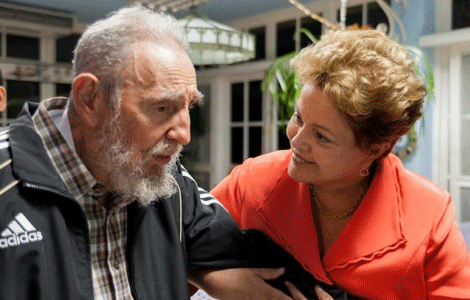

 |
|
Russian President Vladimir Putin (C) is welcomed by European Council President Herman Van Rompuy (L) and European Commission President Jose Manuel Barroso upon his arrival at the EU council headquarters for a EU-Russia Summit in Brussels January 28, 2014. [Photo/Agencies] |
TRADE AND ENERGY
While the escalating crisis has caused alarm, Russia and the EU were not expected to issue a joint statement and no agreements were expected to be signed on Tuesday.
Adding to the strains are tensions over trade and energy.
The EU relies heavily on imports of Russian gas and, while that gives Moscow a certain amount of leverage, Russia also relies on the EU as a buyer, since other markets are not so developed.
The EU has also launched a World Trade Organization dispute against Russia alleging that it protects its carmakers illegally, while the EU's executive Commission is investigating Gazprom on suspicion of hindering the free flow of gas across Europe and imposing excessively high prices.
Gazprom could be fined up to $14 billion if it is found to have broken EU antitrust rules.
Despite the tensions, two-way trade between Russia and the EU totalled over 330 billion euros ($451 billion) in 2012.
EU leaders are also expected to raise concerns over human rights in Russia, including gay rights, an EU source said.
In what was widely seen as an attempt to improve Russia's image before next month's Winter Olympics in Sochi, Putin has freed members of the Pussy Riot punk protest group, dropped charges against arrested Greenpeace activists and freed Mikhail Khodorkovsky, one of his best known opponents, from jail.







